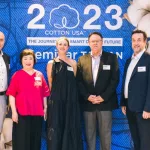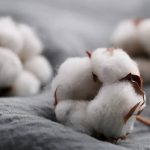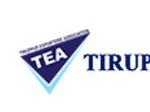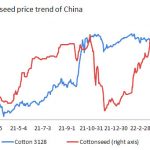Textile industry professionals have been saying for some time that there are more organic cotton claims on the market than actual organic cotton grown. Meanwhile, fiber misrepresentation related to inaccurate organic cotton claims represents a vexing problem. Once cotton has been ginned and spun, there is apparently no way to verify that it was grown organically. Lab tests can’t tell, and clothing fabricators buying cotton anywhere in the world have to rely on the certificates that accompany the higher prices they pay for organic cotton.
According to Eric Henry, president of tsdesigns in Burlington, NC, USA, this problem can be mitigated -if not altogether solved – by shortening the supply chain. With this in mind, his company has launched a new garment line under the “Cotton of the Carolinas” brand. All items are made from cotton grown, processed, and sewn, in North Carolina. In addition to adding a new level of verifiability to the supply chain, he says his “Cotton of the Carolinas” t-shirts also have a reduced carbon footprint over brands made in one country, then sold in another. Excerpts of an interview with Eric Henry are reproduced below.
How did you develop the idea for a locally-based transparent supply chain?
North Carolina is one of the top five cotton-growing states (in the USA) and the majority of that cotton is sent overseas (to make apparel) that comes back and is sold in our big box stores. In this idea of “Cotton of the Carolinas,” which we describe as “shirt to dirt,” we went to (North Carolina-based operations) for our farmer, ginner, spinner, knitter, finisher, cut and sew (operations) and then to tsdesigns for print and dye.
What are the benefits to your customers?
We’ve created a completely transparent business model so when somebody gets a “Cotton of the Carolinas” t-shirt, they get access all the way back to the farmer or ginner or spinner. People want to go buy that great-looking t-shirt or that great looking dress and at best they might (be able to identify) the country of origin. But that’s just the last place where it was made. There’s no way to see across the supply chain that made that item and I wanted to let people know where their cotton comes from (i.e. our supply chain).
In addition to supply chain transparency, you also began selling a t-shirt made from certifiably organic cotton grown in North Carolina. Why did you decide to go with locally-grown organic cotton?
If you add up all of the organic cotton claims being made, there’s significantly more than is being grown. How do you deal with that issue of misrepresentation in the marketplace of conventionally grown cotton being sold as organic? That was the reason why we grew Organic Cotton of North Carolina (which they have begun selling under the brand name, “tsdorganic”). We can track (tsdorganic organic cotton) all the way to the farm. Since we buy directly from the farm, we have control of the supply chain. In the 1st year, we bought 25,000 pounds from two farmers in Nash County (NC) who grew organic cotton on 50 acres.
Is all of your organic cotton grown locally?
We still buy a lot of organic cotton from Pakistan, Turkey, and India. All we get, when we pay the organic price, is the organic cotton certificate. That’s all I can show our customers. But there is no way, at this point, that you can take that cotton into a lab and begin to establish whether it’s organic or conventional. Years ago when there were a lot more chemicals used (when growing cotton) it was easier to distinguish. Now it’s not. So it’s a challenge and we do the best we can. But that’s another reason why we wanted to grow our organic cotton in North Carolina, so we can keep control of the supply chain. We have visited that farm in Nash County. The chance of my getting over there to Pakistan and seeing the farm and meeting the farmer is basically zero.
How are people in the textile industry responding to what you are doing?
I see a growing group or community out there that wants to support us. They are reacting positively. “Cotton of the Carolinas” is our fastest growing product line. (In addition to t-shirts sold under that label) last year we started our private label program and have customers like Mast General Stores participating in that program. They can buy a t-shirt and instead of the “Cotton of the Carolinas” label they put their own Mast General Stores label on it. So we’re letting Mast General Stores sell a t-shirt (with the store label) and their customers get a t-shirt that they can track through our entire supply chain.
Do you have any parting thoughts?
This has been a very challenging road because we have had to spend so much time educating people. But what drives me is feeling that this is the right path. We wanted to let people know where their cotton comes from and that was the whole vision behind “Cotton of the Carolinas.” (Courtesy : Glenna B. Musante, AATCC)






